Daily Vocabulary Words: List of Daily Used Words in Leading International Newspapers
Hi there. Welcome to this special section @ Wordpandit.
Our endeavour here is very simple: to highlight important daily vocabulary words, which you would come across in leading newspapers in the country. We have included the following newspapers in our selection:
• The New York Times
• The Washington Post
• Scientific American
• BBC
• The Guardian
• Psychology Today
• Wall Street Journal
• The Economist
We are putting in extensive work for developing your vocabulary. All you have got to do is be regular with this section and check out this post on a daily basis. This is your repository of words that are commonly used and essentially, we are posting a list of daily used words. Hence, this has significant practical application as it teaches you words that are used commonly in leading publications mentioned above.
Visit the website daily to learn words from leading international newspapers.
WORD-1: Unprecedented
CONTEXT: Daniel Noboa, innovated last week with the unprecedented declaration of a state of “internal armed conflict”.
SOURCE: Guardian
EXPLANATORY PARAGRAPH: Imagine you’ve been playing hide and seek with your friends for years, but one day, you find a hiding spot that no one has ever thought of before. That feeling of discovering something completely new and never seen before is what it means for something to be “unprecedented.” It’s like breaking all the records and doing something that has never been done before.
MEANING: Never having happened before; unparalleled or unprecedented (adjective).
PRONUNCIATION: un-PREH-suh-den-tid
SYNONYMS: unparalleled, unprecedented, unmatched, exceptional, extraordinary, novel, groundbreaking
USAGE EXAMPLES:
1. The company achieved unprecedented success with its latest product launch.
2. The unprecedented heatwave caused record-breaking temperatures across the region.
3. Her achievement in the competition was unprecedented in the history of the event.
4. The team’s comeback victory was unprecedented and left the fans in awe.
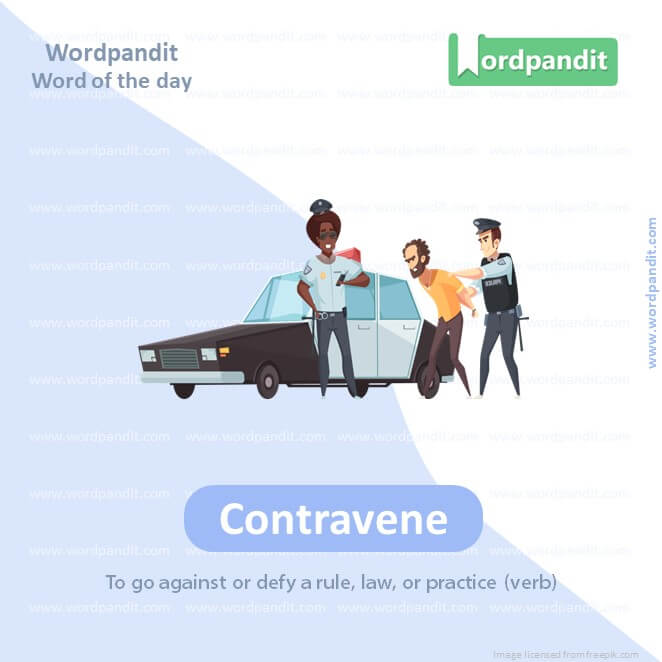
WORD-2: Contravene
CONTEXT: By applying the laws of war to organised criminals as if they were terrorists or insurgents, the move may contravene international law, Human Rights Watch’s deputy Americas director, Juan Pappier, told the Washington Post.
SOURCE: Guardian
EXPLANATORY PARAGRAPH: Imagine your teacher tells you to sit quietly during the exam, but you keep whispering answers to your friend. Your actions are going against the rules or instructions given by the teacher. That act of breaking or disobeying a rule is called “contravene.” It’s like doing the opposite of what you’re supposed to do.
MEANING: To go against or defy a rule, law, or practice (verb).
PRONUNCIATION: kun-truh-VEEN
SYNONYMS: violate, disobey, breach, infringe, transgress, flout, defy
USAGE EXAMPLES:
1. The company was fined for contravening safety regulations in the workplace.
2. Smoking in public places contravenes the city’s anti-smoking laws.
3. His actions contravened the terms of his contract with the company.
4. The politician was accused of contravening ethical guidelines with his behavior.
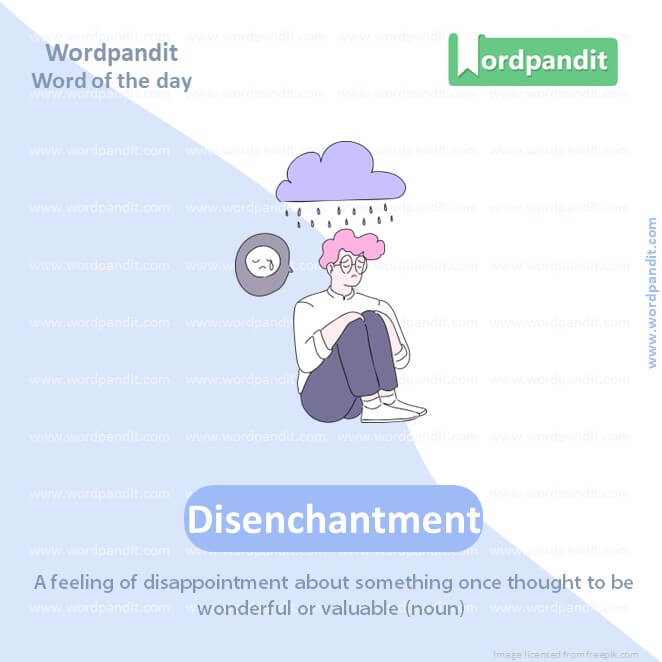
WORD-3: Disenchantment
CONTEXT: Burgeoning security issues are a significant factor in Latin America’s growing disenchantment with democracy.
SOURCE: Guardian
EXPLANATORY PARAGRAPH: Imagine you’re eagerly waiting for your birthday, expecting a big party with lots of presents and fun. But when the day comes, nobody remembers, and there’s no celebration. That feeling of disappointment and sadness when things don’t turn out as you hoped is called “disenchantment.” It’s like losing the magic and excitement you once had.
MEANING: A feeling of disappointment about something once thought to be
wonderful or valuable (noun).
PRONUNCIATION: dis-en-CHAN-tment
SYNONYMS: disillusionment, disappointment, discontent, dissatisfaction, disenchantment, letdown, disillusion
USAGE EXAMPLES:
1. The film explores themes of disenchantment and longing for something more in life.
2. His disenchantment with politics led him to withdraw from the political scene.
3. The students expressed their disenchantment with the school’s decision to cancel the field trip.
4. After the initial excitement wore off, she experienced a sense of disenchantment with her new job.
WORD-4: Emulate
CONTEXT: Bukele’s approach has generated a lot of discussion and interest, but no country has moved to actually emulate the method.
SOURCE: Guardian
EXPLANATORY PARAGRAPH: Imagine you admire your older sibling’s amazing drawing skills and want to draw just like them. So, you study their drawings carefully and try to copy their style and technique. When you try to be like someone you admire, you’re “emulating” them. It’s like trying to imitate or copy the way they do things because you think it’s great.
MEANING: To imitate or strive to equal or excel, especially through imitation (verb).
PRONUNCIATION: EM-yuh-layt
SYNONYMS: imitate, mimic, copy, mirror, replicate, follow, model
USAGE EXAMPLES:
1. The young artist sought to emulate the techniques of the masters in his paintings.
2. He admired her leadership qualities and sought to emulate them in his own work.
3. The new software aims to emulate the functionality of traditional pen and paper.
4. Many fashion designers emulate the styles of famous celebrities in their collections.
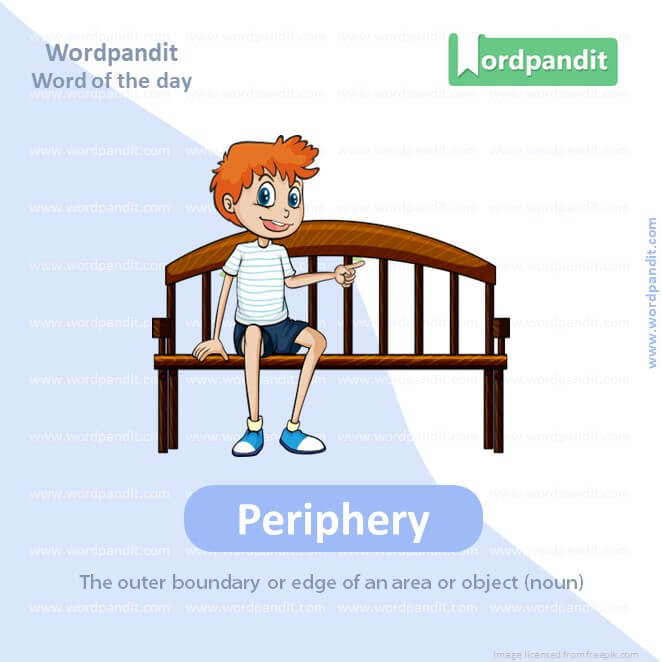
WORD-5: Periphery
CONTEXT: Human rights have been pushed to the periphery of the conversation.
SOURCE: Guardian
EXPLANATORY PARAGRAPH: Imagine you’re standing in the middle of a big circle, and everything around you is the outer edge of that circle. That outer edge, where things are farthest away from the center, is called the “periphery.” It’s like the border or boundary of something, where things start to be different or less important.
MEANING: The outer boundary or edge of an area or object (noun).
PRONUNCIATION: puh-RIF-uh-ree
SYNONYMS: outskirts, fringe, edge, border, boundary, margin, rim
USAGE EXAMPLES:
1. The town is located on the periphery of the national park.
2. His ideas were on the periphery of mainstream scientific thought.
3. The new shopping mall is on the periphery of the city, away from the downtown area.
4. The issue was on the periphery of the discussion, but it still had some relevance.
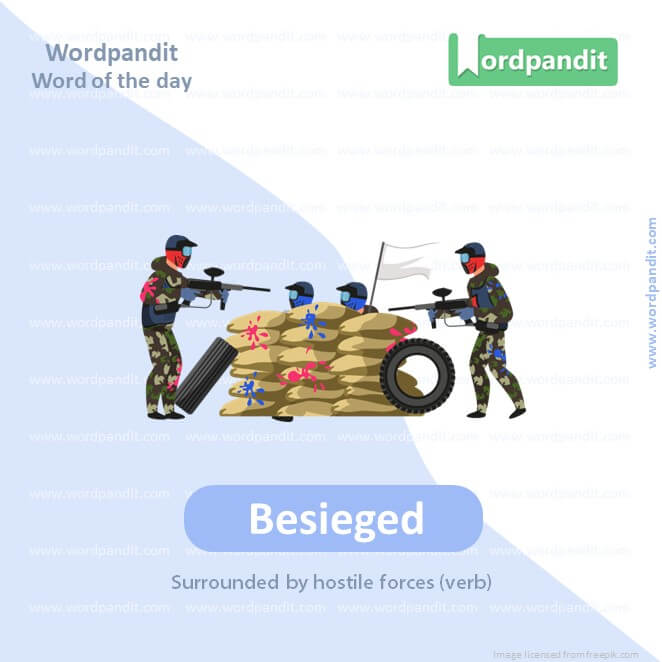
WORD-6: Besieged
CONTEXT: It is understandable that human rights are an intangible concern for people besieged by criminal groups.
SOURCE: Guardian
EXPLANATORY PARAGRAPH: Imagine you’re playing in a castle made of pillows when suddenly all your friends charge in, surrounding you from all sides and not letting you escape. That feeling of being surrounded and trapped by something, like your friends in the pillow fort, is what it means to be “besieged.” It’s like being under attack or surrounded by enemies.
MEANING: Surrounded by hostile forces (verb).
PRONUNCIATION: bih-SEEDJ
SYNONYMS: surrounded, encircled, besieged, overwhelmed, inundated, swarmed, bombarded
USAGE EXAMPLES:
1. The city was besieged by enemy forces for months before finally surrendering.
2. The company was besieged by negative publicity following the scandal.
3. She felt besieged by demands from work, family, and friends all at once.
4. The village was besieged by a horde of hungry wolves during the harsh winter.
WORD-7: Intangible
CONTEXT: It is understandable that human rights are an intangible concern for people besieged by criminal groups.
SOURCE: Guardian
EXPLANATORY PARAGRAPH: Imagine you have a special friend who always listens to you and makes you feel better when you’re sad. You can’t see or touch the friendship, but you know it’s there because you feel it in your heart. That invisible but real feeling of connection and support is called “intangible.” It’s like something you know is there even though you can’t see or touch it.
MEANING: Unable to be touched or grasped; not having physical presence
(adjective).
PRONUNCIATION: in-TAN-juh-buhl
SYNONYMS: abstract, invisible, impalpable, incorporeal, ethereal, elusive, indiscernible
USAGE EXAMPLES:
1. Happiness is an intangible feeling that cannot be bought with money.
2. The value of the company lies not only in its tangible assets but also in its intangible assets like reputation and brand.
3. Trust is an intangible but essential element in any relationship.
4. The artist aimed to capture the intangible essence of love in his paintings.
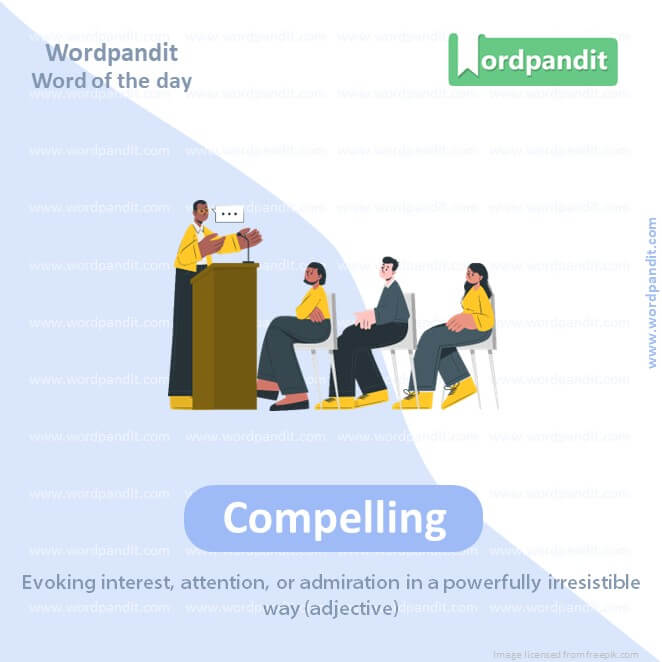
WORD-8: Compelling
CONTEXT: If you are likely to be killed by a stray bullet, or kidnapped by a criminal group, due process is not compelling.
SOURCE: Guardian
EXPLANATORY PARAGRAPH: Imagine you’re reading a book that’s so exciting and interesting that you can’t stop turning the pages. You’re drawn into the story, eager to find out what happens next. That feeling of being irresistibly captivating or convincing is what it means for something to be “compelling.” It’s like being so fascinating or persuasive that you can’t ignore it.
MEANING: Evoking interest, attention, or admiration in a powerfully irresistible
way (adjective).
PRONUNCIATION: kuhn-PEL-ing
SYNONYMS: convincing, persuasive, captivating, irresistible, gripping, engaging, enthralling
USAGE EXAMPLES:
1. The documentary presented a compelling argument for environmental conservation.
2. Her speech was so compelling that it changed many people’s minds on the issue.
3. The novel had a compelling storyline that kept readers hooked until the end.
4. The actor’s performance was compelling, drawing the audience into the character’s struggles.
WORD-9: Condemnation
CONTEXT: condemnation of the violence from human rights organisations, the United Nations and even the pope has yet to translate into meaningful action from political leaders.
SOURCE: Guardian
EXPLANATORY PARAGRAPH: Imagine you accidentally spill paint on your mom’s favorite dress, and she gets really angry and scolds you for being careless. That feeling of being criticized or blamed for something you did wrong is called “condemnation.” It’s like being judged or punished for your actions.
MEANING: Strong disapproval or censure; the act of expressing very strong criticism or disapproval (noun).
PRONUNCIATION: kun-dem-NAY-shun
SYNONYMS: criticism, denunciation, censure, reproach, rebuke, reprimand, castigation
USAGE EXAMPLES:
1. The politician faced widespread condemnation for his controversial remarks.
2. Her actions received condemnation from her peers and colleagues.
3. The organization issued a statement of condemnation against the violence.
4. The artist’s work drew both praise and condemnation from critics.
WORD-10: Indulgent
CONTEXT: an indulgent modern preoccupation of “leftists and academics”.
SOURCE: Guardian
EXPLANATORY PARAGRAPH: Imagine you’ve been asking for ice cream all day, and finally, your mom gives in and lets you have two scoops instead of one. That act of giving in to your desires or wishes, even if it’s not the best thing for you, is called “indulgent.” It’s like getting what you want, even if you shouldn’t have it.
MEANING: Allowing oneself or someone else to have or do something enjoyable, even if it’s not necessarily good for them; being overly lenient or permissive (adjective).
PRONUNCIATION: in-DUHL-jent
SYNONYMS: lenient, permissive, indulgent, tolerant, lenient, lenient, forgiving, liberal
USAGE EXAMPLES:
1. She had an indulgent grandmother who always let her have dessert before dinner.
2. The teacher was indulgent towards her students’ occasional tardiness.
3. The parents were criticized for being too indulgent with their children’s demands.
4. He was known for his indulgent lifestyle, often spending money lavishly on luxury items.
Vocabulary Grammar
The journey of language mastery is a thrilling blend of words and structure, often referred to as ‘vocabulary grammar’. These critical components of any language work hand in hand to facilitate meaningful communication. However, embracing ‘vocabulary grammar’ requires a nuanced understanding and a strategic learning approach.
The initial step towards understanding ‘vocabulary grammar’ is to study the functionality of words in a sentence. Grammar holds the key to how vocabulary is structured in language. Therefore, observe how words change or influence meaning when placed differently in a sentence.
Leveraging diverse resources is a great way to grasp ‘vocabulary grammar’. Engage with a range of reading materials, audio-visual resources, and interactive language apps. This offers genuine exposure to ‘vocabulary grammar’ in real-world contexts and enhances comprehensive learning.
While learning ‘vocabulary grammar’, it’s important to see vocabulary and grammar as interconnected. Understanding how different parts of speech function can help in the effective usage of vocabulary. Try creating your own sentences using new vocabulary following certain grammatical rules to reinforce learning.
Revision holds its due significance in mastering ‘vocabulary grammar’. Regular review of learnt grammar rules and vocabulary ensures long-term retention and bolsters understanding. Use techniques like spaced repetition to make your review sessions more effective.
Lastly, practicing ‘vocabulary grammar’ is key to cementing your knowledge. Whether it is through writing exercises or conversing in the language, practicing allows you to apply ‘vocabulary grammar’ in a practical context and aids in accurate language use.
In conclusion, understanding ‘vocabulary grammar’ calls for conscious observation, diversified resources, interconnected learning, regular revision, and relentless practice. As you navigate this path, you will see ‘vocabulary grammar’ like two sides of the same coin, both essential to the value it holds in the wealth of language learning.










